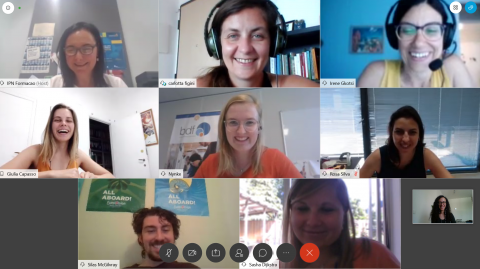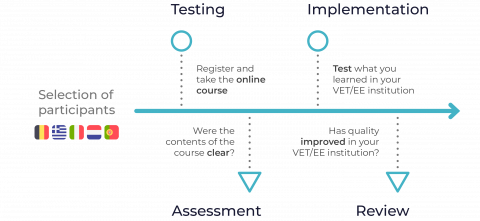4.1 - Learners’ feedback – learning experience
Abstract
In order to meet the needs of the learners and thus to provide the best VET entrepreneurship
education possible, as a Quality Manager you need to gain learner feedback on their learning
experience. Thus, education can be improved in a way that enables learners to make the most of
themselves.
Why is this important for you as a QM?
- To know what needs to be improved regarding the quality of education;
- To improve certain elements in your own education programmes;
- To make the learners aware that their feedback is important. Thus, they will have a feeling of being appreciated. This way, they will be motivated to put extra effort in their education, which will increase participation, completion and placement rates in VET programmes;
- To attract more potential learners to choose your VET institution. If they hear that your VET institution appreciates learner feedback, they will be more motivated to follow VET programmes in your VET institution.
How should I implement the action?
- Make use of learner-surveys relevant for entrepreneurial learning (entrepreneurial knowledge and skills);
- Include a learner feedback policy in your course syllabus where you state that their feedback is appreciated throughout the semester/course and not only after it ends;
- Make sure the learners know that they are in a feedback friendly classroom from the beginning by emphasising the importance of learner feedback so that the learners will learn more effectively and so that the teacher will be better at his/her job;
- Pay attention to the type(s) of learner feedback which is/are most relevant. For example, self-assessment of own knowledge, competence and/or skills, acquirement, the delivery of methodology, instruction delivery, time management of the course, etc.;
- Recognise learner feedback by always following up on it with a response/action plan. Learners will appreciate this. When their feedback is ignored, though, this could have a negative impact;
- After learner feedback, don’t get too upset by outliers if they are present, as even the best teachers get critical or even hurtful feedback from their learners now and then;
- It is not a problem if you don’t have an immediate response to learner feedback, let them know you must reflect on it and will come back with a response/action plan;
- If the feedback is challenging, you can discuss this with your colleague(s);
- It might take a lot of courage for the learners to give you feedback, so always show your gratitude for their feedback, even if you don’t agree with it;
- Provide your learners with the possibility to give anonymously written feedback, so they give you sincere feedback sooner;
- Measure the mechanism used to collect feedback and review it from time to time.
How should I know if I have made impact thus increasing the quality of the VET provision and to which extent? (Indicators also linked with the EQAVET if any):
- If you obtain learner feedback the right way, it may contribute to the participation rate (with an increase of at least 10% for successful implementation results after a year) in your institution’s VET programmes, as learners will spread the word that their feedback is valuable in your institution and that actions will be taken to improve their education, based on their feedback;
- If you obtain learner feedback the right way, it may contribute to the utilization of acquired skills at the workplace, as learners will be more motivated to complete a VET programme, knowing that their input is also important;
- If you obtain learner feedback the right way, it may contribute to the completion rate in your institution’s VET programmes, as learners will be more motivated to complete a VET programme, knowing that their input is also important. The completion rate needs to be increased with at least 10% after a year;
- If you obtain learner feedback the right way, it may contribute to the schemes used to promote better access to VET, as learner feedback priority of your institution could be a great “selling point” to promote and attract more learners.
Links & further readings (includes also third-party resources- videos, etc.):
- IN-QUAL project’s Common Reference Framework, chapter 2. Standard principles and indicators of entrepreneurship education providers
- IN-QUAL project’s Guidelines, G 4 – Include feedback into daily practices and procedures
- GW University Teaching & Learning Center (n.d.). Sample Questions for Getting Feedback from Students.
- Davis, V. (2015). 3 Ways of Getting Student Feedback to Improve Your Teaching. Retrieved on 29 January 2020 from https://www.edutopia.org/blog/student-feedback-improves-your-teaching-vicki-davis
Glossary
Unit 4
Time - Preparatory phase:
Low:
1 hour to 1 day
Time - Regular tasks:
High:
every day
Time - Length of commitment:
High:
> 1 month
HR - Number of staff members:
Medium:
Up to 50% of staff
HR - Commitment by staff members:
High:
More than 1 month
Economic investment:
Medium:
Investment is option
ICT skills:
Basic
Suggested Cards: before reading the current one:
Suggested Cards: after reading the current one:



